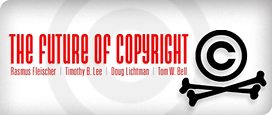I’d like to expand on Tom Bell’s point regarding winners and losers.
Doug Lichtman writes that the continued viability of copyright will require “more complicated interventions that, by design, influence the development of technology tools and services.” This is spot-on, although “influence” is an understatement. Lichtman suggests that he wants to “accommodate as many business models as plausible,” but I think Bell is right that he’s ignoring the trade-offs involved. Allow me to illustrate this point with a couple of examples.
Back in the late 1990s, companies started to develop MP3 players that are essentially miniature musical jukeboxes. The recording industry sued to block their sale, but was unsuccessful. The result was a surge of innovation, culminating in the iTunes/iPod ecosystem that now dominates the digital music marketplace. It’s tough to say what would have happened if the recording industry had won that lawsuit, but I think it’s safe to say that it would have taken longer for portable music players to emerge on the scene, and that the digital music ecosystem would be less advanced today.
Fast forward a few years, and we can see that hard drives are now large enough that one could easily build a set-top box that does for your DVD collection what the first iPod does for your CDs. Insert each DVD you own once, and the box copies it to your hard drive. From then on, you can watch any DVD you own with the touch of a button. And of course, you’d likely be able to do much more than that: stream movies wirelessly to different TVs around your house, stream them to yourself while you’re on the road, transfer them to an iPod or other mobile device to watch on the road, and so forth. Even more important, the existence of a competitive DVD jukebox market would likely produce spin-off innovations, just as the MP3 player did, with people developing devices, software, and accessories that interoperate with the DVD jukeboxes.
Unfortunately, Hollywood sued the first DVD jukebox out of existence. And this time, thanks to the DMCA, they’ve won. CDs have no copy protection, so under copyright law anyone is free to make a device to play or manipulate music on CDs. But DVDs do have copy protection, so in effect no one may innovate in the DVD marketplace without Hollywood’s blessing.
Recently, firms have started rolling out video jukeboxes without DVD ripping functionality. Apple has a set-top box called Apple TV, for example, that won’t rip your DVDs, but will sell you the same movies a second time from the iTunes Store. Apple TV is a fine device, but it’s much less capable than the devices we would have gotten had Congress not enacted the DMCA.
I could (and have) give other examples of technology markets the DMCA has harmed, but I think that one suffices to make the point. The “business models” we should be concerned about are not only those concerned with the creation of music and movies, but also with the development of new technologies for manipulating sound and video. A copyright policy that gives content creators veto power over technological innovation may marginally deter file sharing (I have my doubts) but it will also dramatically affect the pace of innovation in digital media devices.
I’m still not sure Lichtman fully grappled with Fleischer’s point regarding the inevitability of widespread sharing. Our current computers and networks are designed from the ground up to facilitate copying without regard to what is being copied. Putting the file sharing genie back in the bottle would required dramatic changes to the Internet and our computers — changes that would make them dramatically less useful for other purposes.
Like Lichtman, I don’t think we’re going to wind up in a police state. But that’s because I don’t think our elected officials will have the stomach to impose the kinds of draconian legal restrictions and penalties that would be required to actually reduce file sharing We’re all copyright nerds so we get excited about questions like contributory liability and safe harbors, but those are really nibbling at the margins of the file-sharing problem. Lichtman seems to think that we can discourage file sharing by going after intermediaries; the hard question is what happens when there are no intermediaries to sue. To repeat Fleischer’s example: “I have all the music from 1950-2010, do you want a copy?” No tweaks to secondary liability rules are going to stop that kind of sharing.
Hollywood and the labels have had more or less free rein inside the beltway over the last decade, getting most of what they’ve asked for from Congress. And they haven’t been shy about sending their lawyers after individual music and movie fans caught using peer-to-peer networks. If these strategies were going to work, we should have started seeing results by now. Yet as far as I can tell, piracy continues uninterrupted. If it were true that the DMCA were essential to stopping file sharing, I might consider the resulting chill to innovation a price worth paying. But that’s not the world we live in. What we’ve gotten instead is rampant piracy and no DVD jukeboxes. That’s not a good outcome, and I don’t share Lichtman’s optimism that more of the same will produce a different result.

